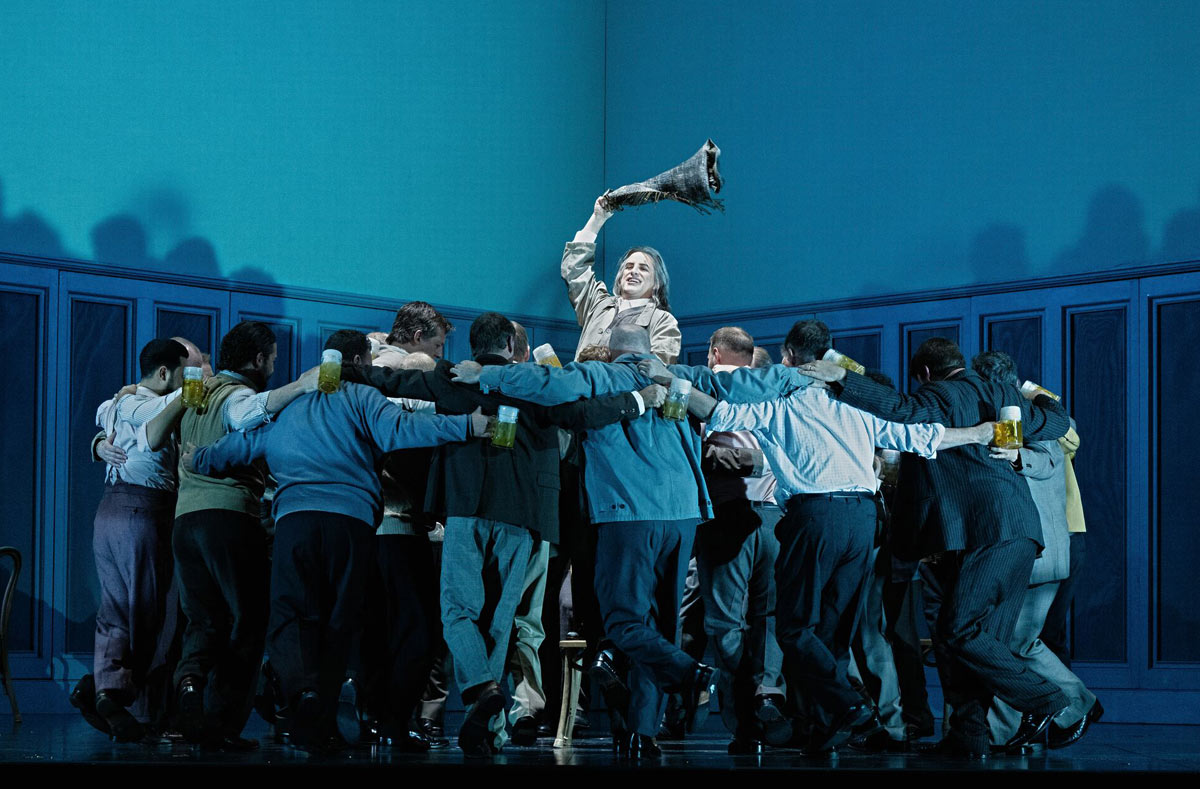Review: THE TALES OF HOFFMANN (Les Contes d’Hoffmann) at Royal Opera House
Director Damiano Machieletto returns to the Royal Opera House with his new production of Offenbach’s THE TALES OF HOFFMANN which wowed audiences at Sydney Opera House in 2023. Here, he is once again joined by Antonello Manacorda who conducts — as he did with the director’s modern take on Carmen which premiered at Covent Garden back in April.
 Juan Diego Flórez as Hoffmann in Damiano Michieletto's production of Offenbach's The Tales of Hoffmann, The Royal Opera ©2024 Camilla Greenwell
Juan Diego Flórez as Hoffmann in Damiano Michieletto's production of Offenbach's The Tales of Hoffmann, The Royal Opera ©2024 Camilla Greenwell
In a mafioso touch, Machieletto keeps the creative team an all Italian affair, with set design by Paolo Fantin, costumes by Carla Teti, lighting courtesy of Alexandro Carletti, choreography from Chiara Vecchi and his chosen stage director is Eleonora Gravagnola. Assembling a regular and trusted coterie of talented creatives is not unusual in opera circles and here, it has paid-off handsomely. The production’s fresh and vibrant colour palette (sets, costumes, lighting and props) is deployed to exotic effect but never crosses a line into pastiche, remaining thoughtfully considered and effective throughout.
We open with a carpet-bag carrying green fairy (Christine Rice) as the Muse of Poetry, just as absinthe is brought to the ageing Hoffmann’s table (Juan Diego Flórez). Thus, his imagination and memories of lost loves are unlocked. She chooses to accompany him on his journey of recollection in the guise of a macaw Nicklausse (Julie Boulianne). Moments later the old man removes his grey wig and dons shorts and a schoolboy’s blazer as we relive his days as a student falling in love with a pretty and clever automaton Olympia (Olga Pudova). The role is renowned for the gymnastic coloratura vocal demands it makes of the performer, but here the trickiness is also rendered visual, with swirling mathematic symbols on a giant classroom screen which are later suspended individually from above, eventually dropping onto the chorus (save one stubborn algebraic bracket on opening night, which resolutely refuted gravity until coaxed to comply - presumably by a frustrated stagehand, high up in the flies)!
As Hoffmann relives each doomed romantic liaison, we encounter the same devilish being Lindorf, Coppélius, Dr Miracle and Dappertutto (power bass Alex Esposito) who intercedes in the affairs of his human playthings, testing them and causing them to succumb to their own inner demons. This is especially cruel with the second lover Antonia (a gentle powerhouse performance from Albanian-born Ermonela Jacob) who here is presented as a wheelchair bound former ballet dancer. Finally, perhaps the most glamorous of the women in Hoffmann’s former life, the courtesan Giulietta (Marina Costa-Jackson) accepts a diamond necklace as payment for trapping his reflection in a magic mirror. Whilst these tweaks to the established roles and format, mark departures from the norm, they were all rendered effectively and should be considered successful stylistic choices - none of which detracted from the story.
The famous barcarolle Belle nuit, o nuit d’amour between Giuletta and Nicklausse had sufficient lilting lyricism to ensure that it didn’t disappoint, and the chorus’s weight and focus was exemplary - demonstrating once more that under William Spaulding’s direction they have blossomed from a once erratic mob into a disciplined and dependable contributor to productions at Covent Garden.
Sung in French with English surtitles, the production plays in repertory until 1st December.
Latest News

 Review Round-Up: OH, MARY! at the Trafalgar Theatre
19 December 2025 at 15:53
Review Round-Up: OH, MARY! at the Trafalgar Theatre
19 December 2025 at 15:53

 The Jonathan Larson Project announces London premiere
19 December 2025 at 10:31
The Jonathan Larson Project announces London premiere
19 December 2025 at 10:31

 Oh, Mary at Trafalgar Theatre Review
19 December 2025 at 09:46
Oh, Mary at Trafalgar Theatre Review
19 December 2025 at 09:46

 Kerry Ellis completes cast for West End concert of Jo - The Little Women Musical
19 December 2025 at 09:35
Kerry Ellis completes cast for West End concert of Jo - The Little Women Musical
19 December 2025 at 09:35